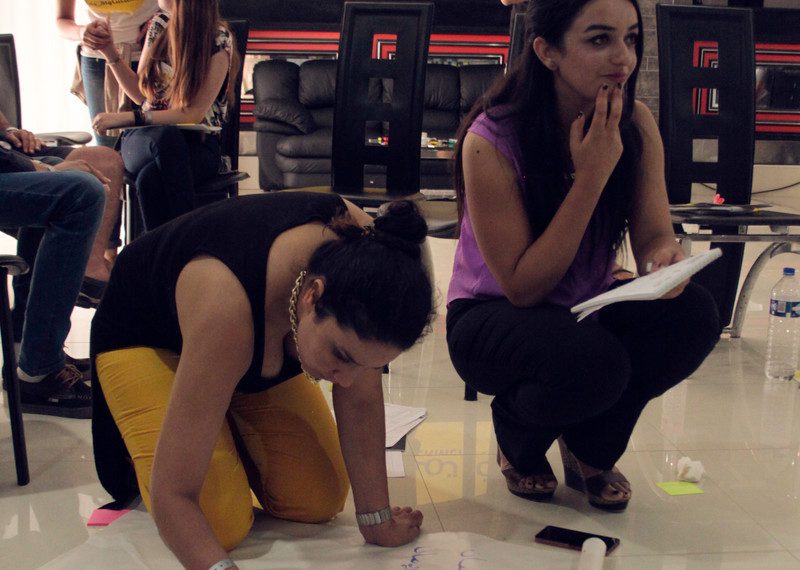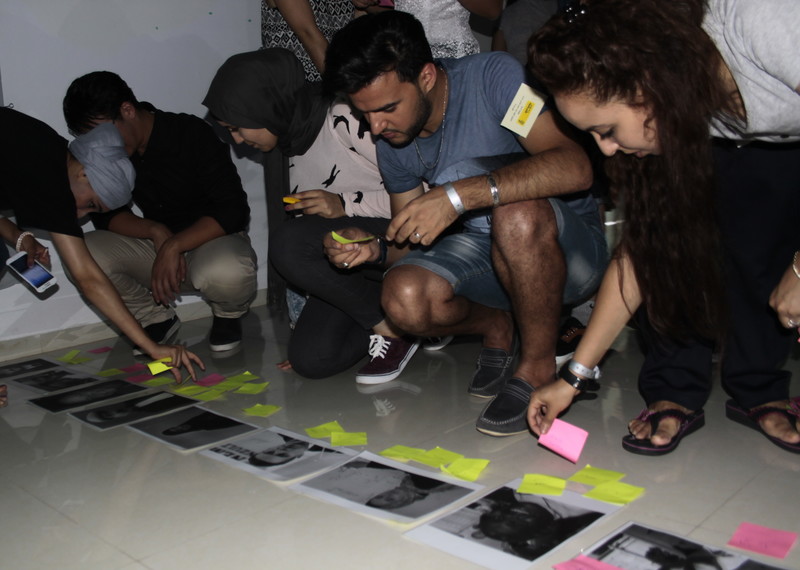Human rights education programmes in the Middle East and North Africa are bringing together young activists to learn how to provide human rights education to other young people. They allow young people to exchange techniques and best practices to improve their facilitation skills and enhance human rights activism in the region.
“These workshops take us from theory to practice and include elements we don’t get the chance to practice before, such as facilitation, training techniques and session design. As a facilitator I always need a push forward to increase my skills, and the regional training is the best way to meet activists from North Africa and share experiences,” says Houssam Hatim, a young educator from Morocco.
Mazen Jaber, Human Rights Education Coordinator for Amnesty’s Middle East and North Africa Regional Office, tells us more about the programmes:
“Preparing a common ground for training connects educators at a regional level and builds on social media to communicate successes. It is essential for increasing support for, and addressing challenges faced by human rights activists across the region,” says Mazen.
Compare and contrast
More than encouraging knowledge and resource sharing, training educators from different countries creates safe spaces to compare and contrast experiences.
Representatives are selected to take part in regional trainings based on their ability to act as multipliers. This helps organizers determine what their expectations are, and tailor workshops according to country-specific needs.
The trainings focus on participants’ understanding of the specificities for each country, so that they can locate themselves in their own context. They also look at past experiences to compare the challenges they encounter as facilitators and plan responses through participative methods such as role-play.
In one such training in North Africa, young educators raised concerns over situations arising during sessions on violence against women where audiences tend to react differently depending on whether the issue is approached from a legal or human perspective. In this case, role-play, acting out a scenario, helped people collectively find a solution.
“This method is open for creative solutions as we want the answers to come from them. We are only here to facilitate situations, and help them reach conclusions by themselves,” says Mazen who has been facilitating the regional trainings.
Analyzing experiences allows educators to identify successful models that can be replicated in different environments. During one such discussion, representatives from Tunisia shared how they recently managed to reach an agreement with the Ministry of Education after facing challenges in regard to accessing formal education.
These exchanges are valuable as a source of inspiration and as a way to re-emphasize the relevance of their role as educators: “Conducting a workshop as a facilitator and later on seeing those same participants lead activities and sessions, we see the torch being passed from one group to another and this is the difference between simply sensitizing people to human rights, and human rights education,” says Amine Letaief, an educator from Tunisia.

Exposing bias, challenging stereotypes
One programme this year focused on training people to deliver education on refugee and migrant rights. Educators learnt about facilitation techniques and lesson plan design, starting with learning how to challenge attitudes and stereotypes for a given audience.
For example, they practiced an exercise to challenge stereotypes using a number of photographs of unidentified people, including figures ranging from poet to war criminal. Based on appearance only, participants write down their first impressions of these images. Their notes are then displayed, and other participants try to match them up with the corresponding photographs. At the end of the activity, the identities of the people in the photographs are revealed and participants realize how judgments are formed through cognitive biases, often disconnected from reality.
“The main message is that impressions can be very wrong and that you can’t judge a person only by their face. This exercise illustrates how participants can understand that we live in a complicated world that we tend to simplify, using stereotypes as mental shortcuts so that we need to think less. But by doing so, we dehumanize people,” says Mazen.
The trainees learned through hands-on experience, and from the advice of experienced facilitators, culminating in designing a series of activities for a half-day workshop on refugee rights tailored for specific groups –including schools, universities or non-governmental organizations.
While broadening their understanding of facilitation techniques, educators were provided with in-depth knowledge of the legal framework on refugee rights. As they analyzed case studies, they learned about the international laws, and conventions on refugees as well as the Regional African mechanism, reinforcing their abilities to work out implications for individual cases and create a platform of dialogue with participants.
“The workshops are designed in a way that makes you stand in refugee’s shoes and empathize with their experience, starting with activities to help us reflect on regional responses to the global refugee crisis, to using drama and role-play to represent the actual situations of refugees around the world”, says Ikram Aïs, an educator from Algeria.

Reinforcing skills, building confidence
Educators are also encouraged throughout the trainings to share best practices to promote active participation and observe how power dynamics are formed within a group, between participants or with the facilitators. This provides them with the tools to become more assertive in defining what their role as educators should be.
“After this training, I feel more empowered to do more to change the world. I don’t want to just gain skills, I want to push other people to have this change in life,” shares Ikram Aïs.
For Mazen, the most rewarding part of the trainings is to see participants realizing that they can design sessions or workshops by themselves without relying on ready-made material: “When they brainstorm in training, this is when they realize how qualified they are. Most of them think they lack the structure or the facilitation skills, whereas it is in fact a matter of confidence. They don’t know how good they are, and the trainings can help achieve this,” he says.
“I didn’t get the chance to work with human rights educators before, so there are a lot of things I had to figure out by myself, like how to enroll or engage people. With this training, I found myself acquiring even more knowledge, even more capacities and capabilities to run workshops, design them and implement them,” says Nahla Bendefaa, an educator from Morocco.


